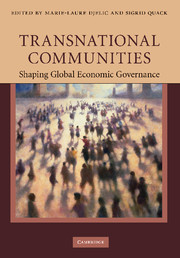Book contents
- Frontmatter
- Contents
- List of figures
- List of tables
- List of appendices
- Contributors
- Preface
- Part I Introduction
- Part II Classical communities with a transnational extension
- Part III Professional communities with a transnational extension
- 5 Transnational boards and governance regimes: a Franco-British comparison
- 6 Private equity in Japan: global financial markets and transnational communities
- 7 Formal organizing and transnational communities: evidence from global finance governance associations, 1879–2006
- 8 Promoting transnational professionalism: forays of the “Big Firm” accounting community into France
- Part IV Virtual communities
- Part V Transnational interest- or issue-based communities
- Part VI Conclusion
- Index
- References
8 - Promoting transnational professionalism: forays of the “Big Firm” accounting community into France
Published online by Cambridge University Press: 07 September 2010
- Frontmatter
- Contents
- List of figures
- List of tables
- List of appendices
- Contributors
- Preface
- Part I Introduction
- Part II Classical communities with a transnational extension
- Part III Professional communities with a transnational extension
- 5 Transnational boards and governance regimes: a Franco-British comparison
- 6 Private equity in Japan: global financial markets and transnational communities
- 7 Formal organizing and transnational communities: evidence from global finance governance associations, 1879–2006
- 8 Promoting transnational professionalism: forays of the “Big Firm” accounting community into France
- Part IV Virtual communities
- Part V Transnational interest- or issue-based communities
- Part VI Conclusion
- Index
- References
Summary
Introduction
The constitution of professional communities is generally thought to take place at national level. The establishment of a profession usually involves negotiations with the nation-state, which allows professionals to exercise their unique and specific knowledge under a regime of self-regulation as long as they guarantee to provide high-quality services. Although the form and degree of self-regulation has varied between countries, generally being more extensive in Anglo-American countries than in Continental European ones (Burrage and Torstendahl 1990), professions have been allowed to set up jurisdictions and to define the boundaries within which they claim exclusive competence and non-interference from other professional or occupational groups.
Critical accounts of professions have highlighted the fact that their boundaries, internal structure, and functions are historically contingent (Abbott 1988; Freidson 2001). Professions are therefore neither internally coherent nor externally clearly bounded. Instead, they should be viewed in terms of an ongoing struggle between different groups about the nature and boundaries of the knowledge for which they claim exclusive jurisdiction and from which they derive a privileged social status. This conception has become prevalent in the investigation of national professional communities. One might wonder whether it also applies to communities that have emerged as a consequence of the globalization of the market for certain professional services.
Professional services are indeed increasingly provided and traded across borders (Suddaby et al. 2007).
- Type
- Chapter
- Information
- Transnational CommunitiesShaping Global Economic Governance, pp. 174 - 196Publisher: Cambridge University PressPrint publication year: 2010
References
- 11
- Cited by



